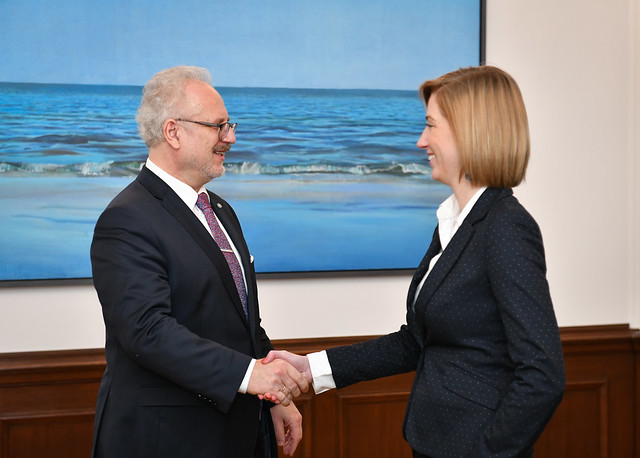‘Diaspora policy is now a distinct field of national policy, a new area of policy, and it is largely shaped by the non-governmental sector and its active contribution to the Diaspora Law and policy. It is a rather new area of policy around the world and Latvia is now focused on developing this strategic area for our nation,’ said President Levits.
Members of the association, several of whose earlier events have been attended by Egils Levits, briefed the President about the current priorities of the association. According to the association, one of its key priorities is organising of returnees into a community that shares its experience and promotes Latvia as a place with limitless opportunities. Members of the association also underlined their readiness to contribute to various national policies through transfer of knowledge and global Latvian network.
President Levits urged association to present its re-emigration strategy to the government. As the association pointed out, Latvia does not need individual re-emigration activities, it needs an integrated strategy that would address various issues in the overall context and long run, not just from the economic perspective of re-emigration. Such strategy would be helpful to local governments that are required to tackle various sides of re-emigration.
Another key focus of the meeting was the growing phenomena of so-called modern jobs and their potential to encourage Latvians to return to Latvia. President and members of the association agreed that by combining civic and government efforts Latvia could create an innovative regulation for remote jobs, drawing on international, European and national tax regulations. ‘Humans approach modern life in a holistic way and organically combine their physical and mental being in various areas of life,’ added Egils Levits. ‘I believe modern jobs policy should become a distinct field of national policies. Looking at the national sustainability strategy, European and global trends, we can definitely achieve that in few years’ time.’ Members of the promised to continue keeping a strong focus on modern jobs because many Latvians who have returned or might potentially return have a lot of questions about, for example, tax policy, especially given their desire to maintain the bond with Latvia while working remotely from another country.
Another issue discussed during the meeting was procedures and other issues linked to recognition of certificates and other professional qualifications. President and members of the association agreed on the need to introduce digital solutions for recognition of certificates across all sectors and make the process of recognition of qualification faster. Society and professional associations responsible for recognition of qualifications need to change their attitude towards those who return and appreciate the contribution that their skill can give to Latvia instead of treating them as competition and threat.
Association ‘Bringing global experience to Latvia’ mostly unites 25-45-year-old Latvians who have studied or worked abroad and have returned to Latvia to live here and provide their knowledge and experience gained elsewhere in the world to various sectors. Association was represented at this meeting by it board members Elīna Grīniece, Māra Rūse, Anna Vladimirova-Krjukova, Agnese Lāce, Miks Muižarājs, Jānis Kreilis and Kristaps Loze.





